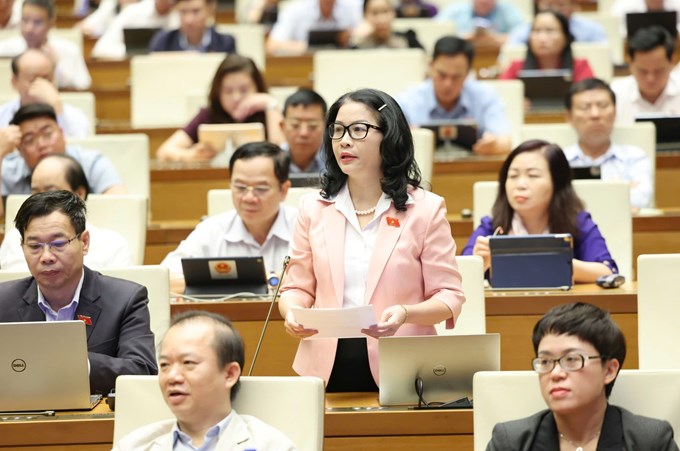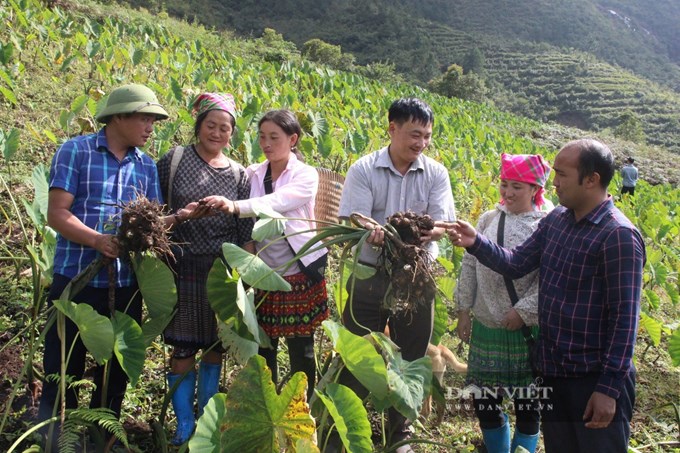At the plenary discussion on the results of the 2025 Socio-Economic Development Plan and the 2026 Socio-Economic Development Plan during the 10th session of the 15th National Assembly, Prof. Dr. Nguyen Thi Lan, President of Vietnam National University of Agriculture (VNUA) and a member of the Hanoi delegation of the National Assembly, proposed several recommendations to strengthen and consolidate the national agricultural extension system.
Highly appreciating the Government’s report on the implementation results of the 2025 Socio-Economic Development Plan and those of the 2021-2025 period, Prof. Dr. Nguyen Thi Lan stated that the report vividly reflected the positive development picture of the country amid numerous difficulties and challenges such as natural disasters, floods, and trade conflicts.
Despite these challenges, Vietnam still maintained macroeconomic stability, creating momentum for growth and reinforcing public confidence; the country’s position and reputation in the international arena were increasingly strengthened. These achievements were clear evidence of the wise leadership of the Party and the National Assembly, the decisive, flexible, and creative governance of the Government, and the unceasing efforts of the entire political system and the people.
As Vietnam was entering 2026, the pivotal year of the new term, adopting science and technology, innovation, digital transformation, and green growth as the pillars of development was a sound policy that would reflect the Government’s strategic vision and commitment to sustainable development.

Prof. Dr. Nguyen Thi Lan, VNUA’s President and a member of the Hanoi delegation of the National Assembly, makes several recommendations on strengthening and consolidating the national agricultural extension system.
Contributing her opinions on the development of human resources in agricultural extension, a critical breakthrough for modern agriculture, Prof. Dr. Nguyen Thi Lan emphasized that if the economy was likened to a house, agriculture was its solid foundation, ensuring social stability and national food security. In the process of building a green, ecological, and high-tech agriculture, the agricultural extension workforce played a pivotal role as the direct channel bringing policies, science, and technology to farmers, helping to transform knowledge into productivity and tangible value. Agricultural extension also served as a bridge between the State, scientists, enterprises, and farmers, an “extended arm” for sustainable rural development and a “key” to unlocking smart agriculture.
“General Secretary To Lam emphasized that ‘Agricultural extension is an important task of commune-level authorities; it is necessary to strengthen the team of extension officers at the grassroots level to ensure close connection with the people and the fields, and to avoid any disruption in extension activities’. This directive demonstrates a strategic vision for developing a modern agricultural workforce,” said Prof. Dr. Nguyen Thi Lan.
According to VNUA’s President, although most localities already had agricultural officers, the number of full-time agricultural extension workers remained limited and uneven in terms of qualifications, especially in remote and mountainous areas. Assessments from the national agricultural extension system and several surveys indicated that around 60-70% of commune-level extension officers had not received specialized training, and over 80% had not been adequately trained in digital technology and smart agriculture.

Agricultural extension officers in Hanh Phuc commune, Lao Cai province, guide local farmers in planting and caring for taro crops. Photo by D.V.
The issuance of Circular No. 60/2025 by the Ministry of Agriculture and Environment established a clear legal framework, helping to streamline and enhance the efficiency of the two-tier agricultural extension system. However, the key priority lied in training and standardizing the agricultural extension workforce, considering it a strategic link in the sustainable agricultural development process.
Citing international experience, Prof. Dr. Nguyen Thi Lan emphasized that any country that valued agricultural extension training would achieve sustainable agriculture. In the United States, the Cooperative Extension System linked the federal government, state authorities, and agricultural universities to provide regular training for extension officers. In Israel, officers received continuous training in irrigation technology, sensors, and agricultural data management. Meanwhile, the Netherlands serves as a model example, where extension officers were trained along agricultural value chains, equipping them with in-depth knowledge of technology, markets, and green standards.
“The lesson for Vietnam is that agricultural extension should not merely focus on ‘technical transfer,’ but must evolve into a role of advisor and connector, heping to link production with the market,” emphasized Prof. Dr. Nguyen Thi Lan, VNUA’s President.
To develop agricultural extension that meets new requirements, in addition to the directions outlined in Circular No. 60/2025, Prof. Dr. Nguyen Thi Lan proposed several key recommendations: (i) First, she emphasized the importance of developing a national competency framework for agricultural extension professionals and a standardized, digitalized training program aligned with the development strategies of each locality, as there was no unified standard and a lack of transferable certification, leading to inconsistent quality; (ii) She also emphasized the need to issue policies to attract and incentivize engineers and young intellectuals to work in rural areas as agricultural extension officers, especially in remote and disadvantaged regions; (iii) In addition, she suggested building a shared agricultural extension database, connecting provinces to communes to support farmers more quickly and effectively, (iv) as well as establishing a transparent and specific monitoring–evaluation mechanism to measure whether agricultural extension activities truly helped farmers improve their capacity and income.
“In the long term, I propose that the development of agricultural extension human resources should be included in the National Strategy on Agricultural Human Resources Development until 2035, considering it a strategic criterion within the program for building model new rural areas and promoting sustainable agricultural development,” stated Prof. Dr. Nguyen Thi Lan.